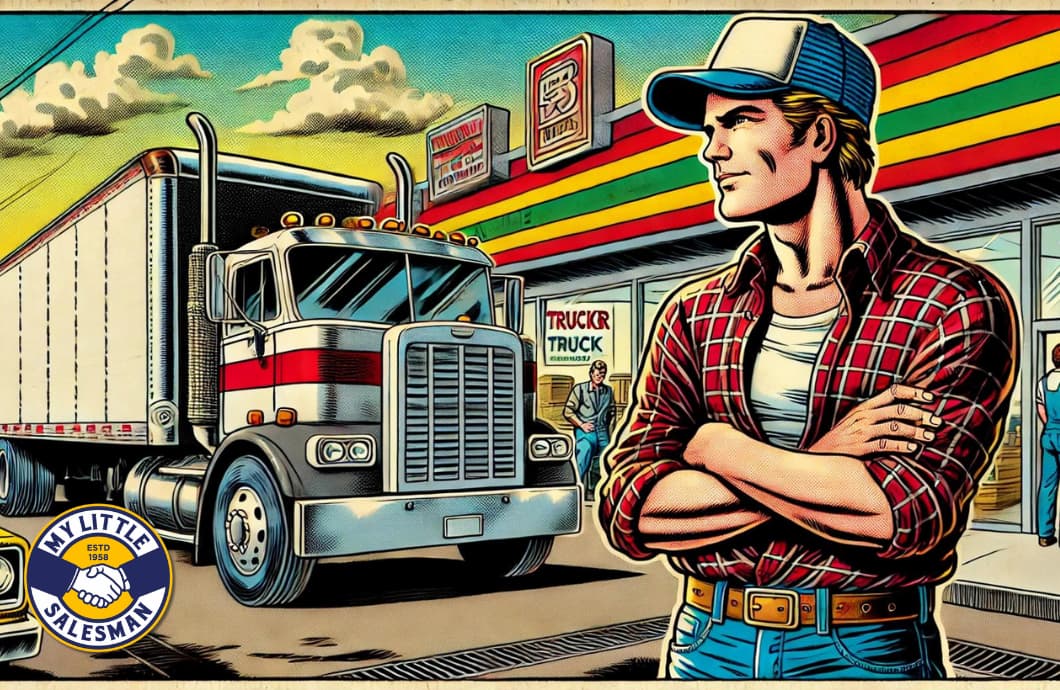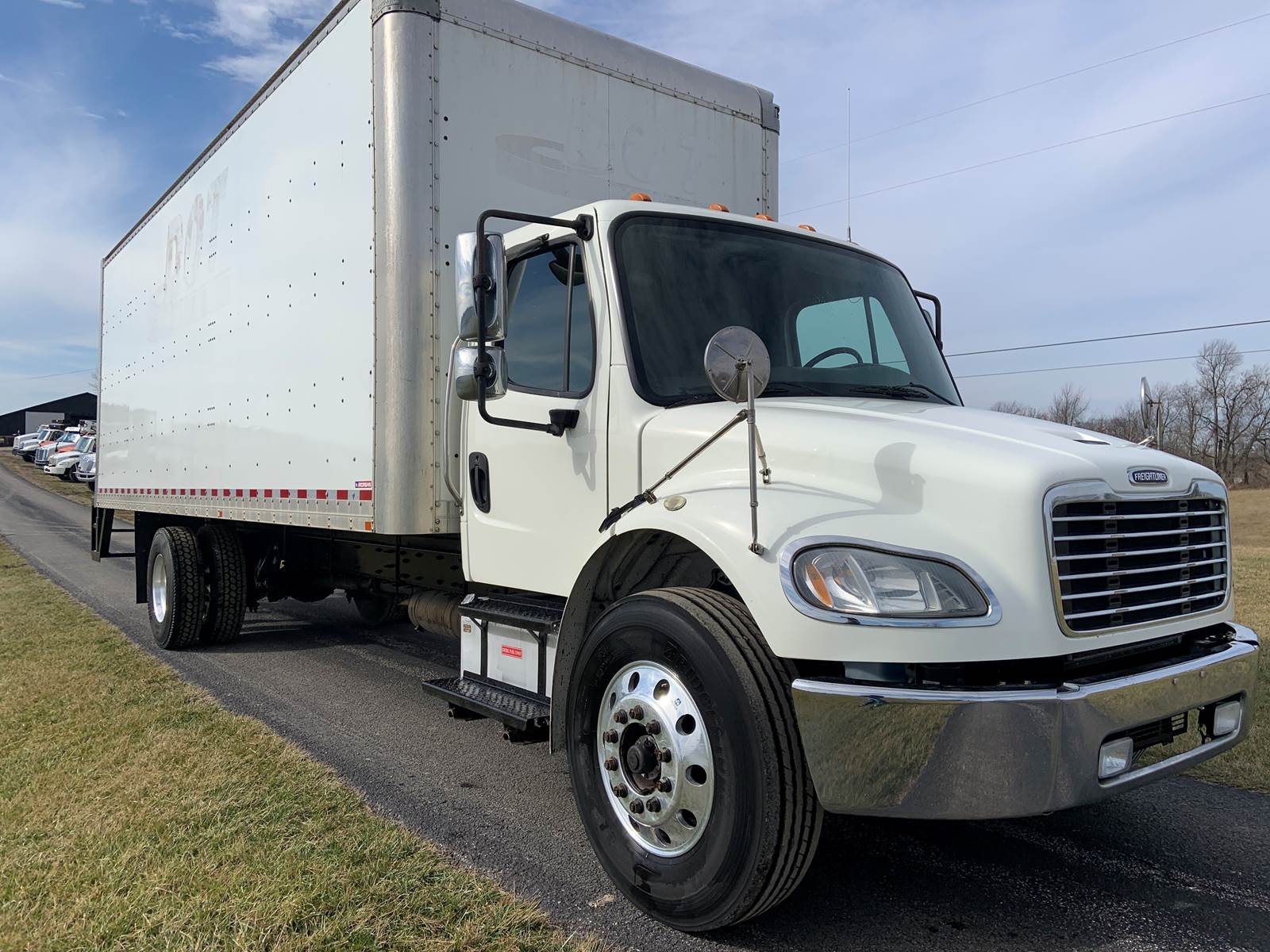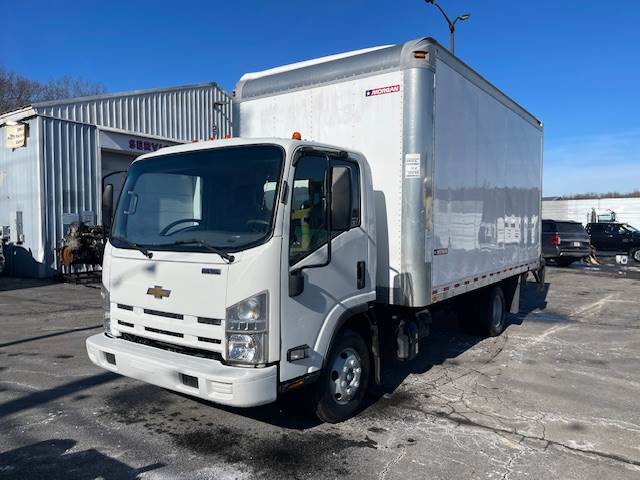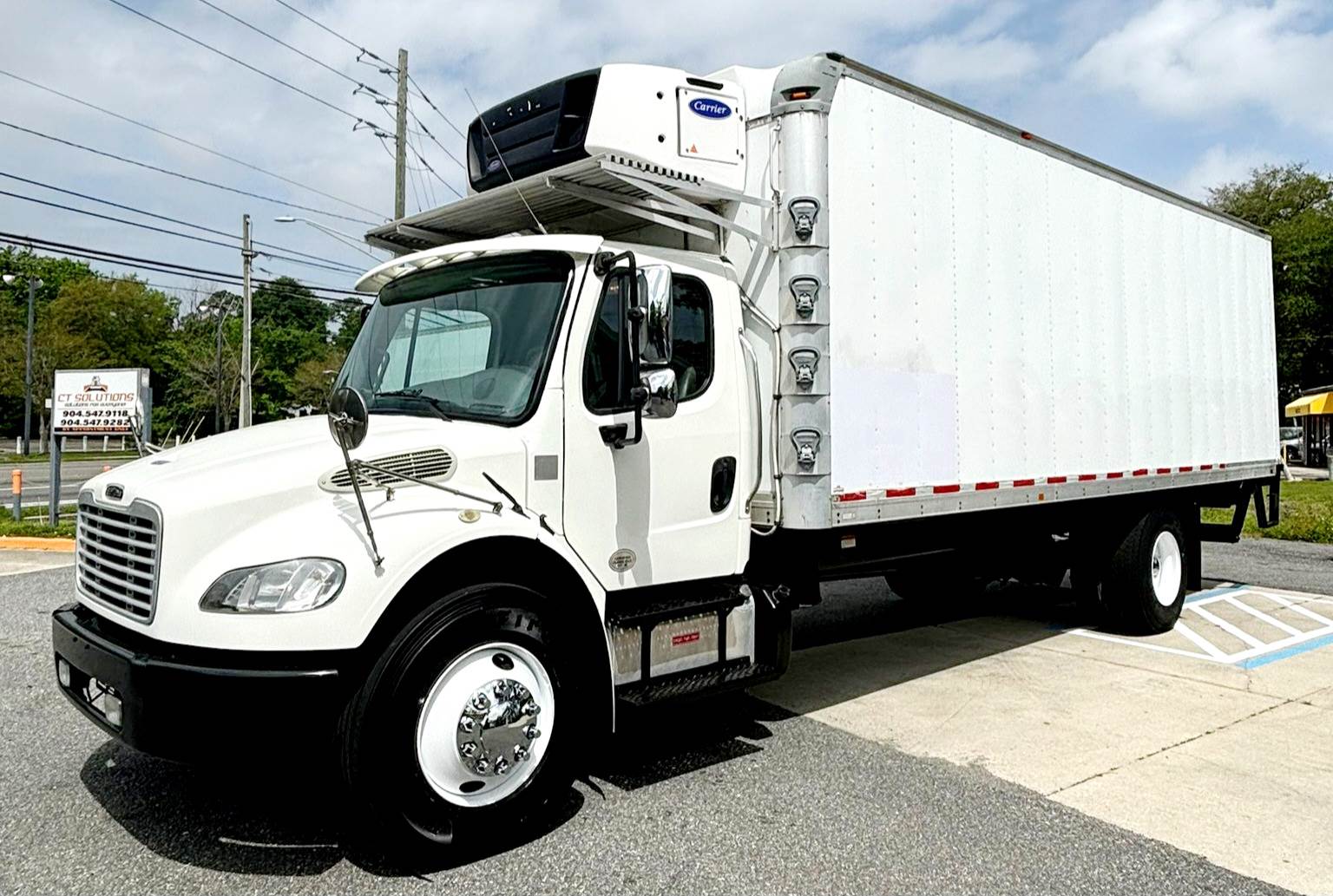
As more folks look for steady scalable streams of income that put them behind the wheel of their own destiny, a popular answer on the internet has been “buy a box truck!”
And there’s a lot to like about starting a box truck business—including the relatively low cost of entry, potentially high profit margins, and usually no requirement for one of those pesky CDLs. Gotta love light duty trucks!
But there are also a lot of pitfalls that many course-selling social media entrepreneurs are keeping to themselves. Fortunately, we’re not selling courses, so we’re happy to spill the beans.
To do this, we’ve consulted experienced commercial truck drivers—employees and owner-operators alike—to give you the real scoop on the important considerations you must make before shopping for your first box truck.
Table of Contents
Business Plans: Your Map to Success
There are Reddit threads aplenty filled with normal folks asking truckers about buying box trucks and hitting the road. While some replies are encouraging, others stress that the original poster needs to understand what they are getting themselves into.
“A box truck business? Hauling what? Where?”
—an experienced and inquisitive trucker on Reddit
While their questions and advice seem harsh, those in the freight industry understand that, while potentially lucrative, a box truck owner with no plan may not be a box truck owner very long.
“I get the feeling you don’t know anything about this industry…Study the industry and see if there’s a gap in the market you can fill.”
A well-designed business plan serves two main purposes:
- Giving you a road map to follow
- Giving financing entities confidence in your ability to be successful…so they can get paid

Freightliner M2 Box Truck
What Should a Box Truck Business Plan Look Like?
While formulating a business plan seems intimidating, it doesn’t have to be. Your plan simply needs to convey that you know what you’re doing and your plan for doing it.
Some of the main points it should contain include:
- Your box truck company’s name and where you’ll operate
- A brief description of your company, about the ownership and employed personnel
- The goals, values, and objectives of your company
- What kind of services you offer or plan to offer
- An idea of the legal structure (LLC? Sole proprietorship? Corporation? etc.)
- A look into market need—including an analysis of conditions
- Your target market, your competition, and your unique selling proposition (how you are different)
- Your pricing structure, how the business does/will operate, and pricing projections
- How much financing you need, for what, and how much you may need in the future
- Balance sheets and a breakeven analysis (plans for how you’ll become profitable)
While an initial plan can be subject to change with changing market conditions, it is important to take your time in constructing your plan. Do your research and answer all questions honestly.
To help you flesh out this plan, let’s hop into several items you need to consider before even filing as a business.
How Will Your Box Truck Business Stand Out?
We have good news and bad news—summarized in one statement: the box truck business has never been bigger.
Due to various factors—including an exploding e-commerce marketplace, heightened urbanization, and supply chain gaps —the multi-billion-dollar box truck industry is slated to grow by over 4% year over year between 2024 and 2032.
While this is excellent news on the demand side of your business, this also means you’ll have plenty of competition. For this reason, it is imperative that you do your research to find ways to stand out from your competition. And while undercutting the competition on price is always a thought, there’s some truth to the age-old saying, “There’s always someone willing to do it for less.” And that doesn’t always mean better.
But you can always be different.
Some ideas for standing out from other box truck companies include:
- Investing in GPS shipment tracking capabilities for customer freight (folks love a tracking number)
- Maintain the highest level of customer satisfaction with prompt replies and communication throughout
- Go the extra mile in terms of reliability and timeliness
- Institute customer loyalty programs to keep them coming back
- Emphasize competitive and transparent pricing free of nickel-and-dime fees
- Look into how you can utilize the latest technology to automate processes where feasible

Chevrolet/Izuzu Box Delivery Service Truck
Box Truck Income Turnaround
“I made over $100,000 with a box truck in my first year—and you can, too!”
These types of sentiments seem to proliferate social media. And they’re not exactly wrong. However, what many of them fail to mention is that this $100,000 is likely in revenue, not profit.
So, while a box truck owner-operator can easily bring in $100,000-$150,000 in revenue for their business, after the insurance, registration, fuel, maintenance, taxes, and other bills are paid, the owner may only end up seeing $30,000-$60,000—if the business is steady.
But remember that you’re building a business. So, while costs may be high and profits low, if you’re making the right moves in the right conditions, you’re still growing your box truck company—in size, reputation, or other metrics.
Buying a Box Truck: You Get What You Pay For
It can be tempting to get into the box truck business with as small of an investment as possible by buying a cheap used box truck. While there’s nothing wrong with buying a cheap box truck, keep in mind that cheaper, high-mileage models tend to require more maintenance—thus eating up time and money. Investing in used yet reliable box trucks is the safest bet you can make.
Not sure what size, type, or condition of box truck to get? Do your research on buying box trucks before you begin your search.
Also, keep in mind what you plan on hauling. Whether you need a 10-foot box truck or larger trucks—such as a 26-foot box truck—will depend on the cargo you intend to specialize in. There are advantages to both!
Still not sure what box truck you should get? Just ask! Figure out what kind of customers you’d like to have and call them up. Ask them what kind of box truck they recommend. It may seem amateur, but there’s no beating the source.

Freightliner Refrigerated Box Truck, aka Reefer Box Truck
Finding Box Truck Company Financing
Unless you’ve saved up a fairly tidy sum to start a box truck business, you’ll need capital—a fancier term for “money.” This means that you’ll need to borrow money. But from whom?
Here are a few good sources:
- Small Business Administration (SBA) loans can offer good financing with affordable rates and structured payment plans.
- Local banks and credit unions are a solid choice for competitive rates, personalized service at local branches, and flexible terms.
- For some specialized financing options, seek out rate quotes from specialized commercial equipment and vehicle financing companies. Their knowledge of the industry and risks mean they can offer highly competitive rates and additional services—such as maintenance plans, insurance packages, and the like.
There’s More to Insurance Than the Box Truck
If you’re new to obtaining commercial insurance, there are many new considerations that you can’t afford to overlook. Not only will a financed truck likely require comprehensive insurance, but also liability coverage, cargo insurance (covering what you’re hauling) as well as uninsured motorist protection. And depending on the situation and location, other types of insurance coverage may be required.
A shortage in insurance coverage not only spells financial disaster for a new business in case of an incident, but if the company’s coverage falls below required state or federal regulatory guidelines, that’s an entirely new world of hurt in the form of legal troubles and lost licenses.
Sourcing New Jobs For Your Box Truck Company
Contrary to many YouTube videos, there’s more to being a successful box truck owner-operator than just the truck. Marketing and networking are crucial to landing hauling jobs in your area. Fortunately, the internet has greatly simplified much of this process.
Having a high-quality website to feature your box truck company brand and message, as well as service listings, past customer testimonials, and a way to contact you, is crucial. It is also important to encourage customers to provide reviews for your successful box truck business on Google, Yelp, Facebook, and other such locations online. When you get others to toot your horn, the sound travels twice as far.
Fuel Cost Considerations
Among the most variable costs, fuel for your box truck takes the cake. Whether you opt for gasoline or diesel trucks, prices can leap and fall on a dime. For this reason, when budgeting for fuel costs, give yourself some buffer room by erring high to avoid unpleasant surprises. But it pays to keep a close eye on market projections, cost-effective fuel sources (preferably that offer loyalty rewards), efficient routing, and the fuel efficiency of your box truck or trucks. Fuel management tools and apps can also help you stay on top of your fuel spending.
The Cost of Regulation
Remaining compliant with all DOT regulations is expensive—but not as expensive as being non-compliant! Make sure your trucks are compliant with all USDOT regulations, MC rules for commercial carriers, and any other regulations required by your location. These will vary depending on the weight and use of your box truck.
Planning for Maintenance and Repairs
Like or not, your box truck will eventually break down and need repairs. If you’re not budgeting and saving for the required funds and time required to get your truck back on the road, you’re just asking Murphy’s Law to wreck your business. Make sure you’re staying on top of a firm maintenance schedule and putting aside funds for needed parts, labor, and downtime.
Speaking of downtime…
Planning for Dry Spells in Business
Another “when, not if” situation that pays to anticipate will be dry spells. There are times when demand for your services may be low due to any number of factors—a downturned economy, supply chain logistics, regulation changes, and the like. For this reason, it is important to keep a rainy day fund of sorts to be able to pay your bills, pay your commercial drivers (if you hire any), and pay yourself—even when times are lean.
Learn from Experienced Truckers—Not Armchair Entrepreneurs
It may be tempting to believe the fantastical stories you hear from those who just so happen to be selling Start Your Box Truck Business courses. And not to discount these as they may contain some nuggets of great information, but if any course claims to contain game-changing secrets “the big boys don’t want you to know,” you may discover that the secrets may not be so hidden after all.
Most sources of top-shelf information about starting a small trucking business include:
Brought To You By My Little Salesman
This article was brought to you by My Little Salesman. Since 1958, My Little Salesman has brought together buyers and sellers of commercial trucks, heavy equipment, and more. If you’re ready to buy a box truck—or cube trucks, straight trucks, box vans, or the various other names for them—you’re invited to find your ideal truck from the thousands of box trucks listed from reputable sellers all over the world. Use the intuitive search filters to find your next box truck in seconds.
Find Your Next Box Truck For Sale Now